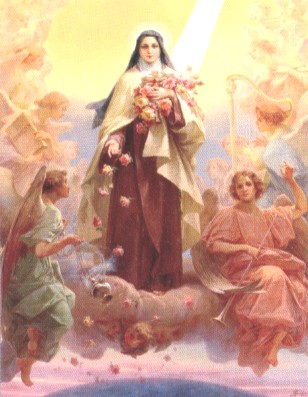 O Cherished Mother, I think that I am more fortunate than Thee, for I have Thee for a Mother, but Thou hast not, like me, Mary to love (Words of the Little Flower).
O Cherished Mother, I think that I am more fortunate than Thee, for I have Thee for a Mother, but Thou hast not, like me, Mary to love (Words of the Little Flower). O Cherished Mother, I think that I am more fortunate than Thee, for I have Thee for a Mother, but Thou hast not, like me, Mary to love (Words of the Little Flower).
O Cherished Mother, I think that I am more fortunate than Thee, for I have Thee for a Mother, but Thou hast not, like me, Mary to love (Words of the Little Flower).
In the midst of the worldwide chorus of approbation of devotion to the Little Flower there are discernible a few feeble but jarring notes of discord. Some of the members of our Society have come to us lately and requested that we solve this objection which had been proposed to them: "Devotion to the Little Flower involves neglect of the Blessed Virgin." At first we were disinclined to think that there was any need of considering this objection as serious. But there is danger that good people might be confused by this objection and therefore we shall answer it publicly.
It is difficult to answer with moderation this charge, because it touches the honor of the little Saint whom we all love so well, and because it is hard to understand how devotion to her could be so misunderstood. Certainly those who made this objection never attended these devotions; certainly they know little of the Little Flower and less of Catholic teaching; for it is not Catholic doctrine, as you all know, that devotion to the Mother of God requires that we pray only to her, and not to the Saints. We shall try however to be temperate in our condemnation of the authors of this objection and shall try to turn the objection to good account by making it serve to enforce our knowledge of the Little Flower and of her devotion to the Blessed Virgin.
It is said that devotion to the Little Flower involves neglect of the Mother of God. For answer, let us turn to the Novena Prayer we often recite. There we find in the prayer that precedes the Litany of the Little Flower these words: "O Little Therese of the Child Jesus, make our troubles thine own and intercede for us to Our Lady Immaculate, whose flower of special love thou wert—to that Queen of Heaven who 'smiled on thee at the dawn of life.' Beg Her as Queen of the Heart of Jesus to obtain for us the grace we yearn for so ardently." So, instead of neglecting Our Blessed Mother, we, who participate in these Little Flower Novena exercises, turn, at the very climax of the Novena Prayers, to the Blessed Mother and ask Her to sponsor the petitions of the Little Flower.
Two of the five annual Solemn Novenas of nine consecutive days in honor of the Little Flower have a relation to Mary—the one in May, Mary's month, and the other in July preceding the Feast of Our Lady of Mt. Carmel. During this latter Novena, one part of each service is held at the Shrine of the Little Flower, the other at the Altar of Our Blessed Mother.
Again, what of the sermons here every Tuesday? How few of them contain no reference to the Blessed Virgin! How few of them contain no illustration of the Little Flower's love of the Mother of God! Who of you has not heard that the Little Flower's chief devotion, after devotion to Our Lord, was devotion to His Blessed Mother? Who of you, who attend these devotions regularly, is not familiar with Mary's smile upon the Little Flower during the latter's childhood? Who of you does not know that it was on account of her love of Mary that the Little Flower entered the Carmelite Order which was the first Order to be dedicated to the Blessed Virgin? Who of the members of our Society is not familiar with these words of which the Little Flower was the author—words amongst the most beautiful ever penned concerning the Blessed Virgin: "Were I Queen of Heaven and Thou Therese, I would wish to be Therese that I might see Thee Queen of Heaven." Could there be love of Mary more tender than that which prompted the beautiful words just quoted? Or those other words which she wrote in a letter to Celine, "Sometimes I find myself saying to the Blessed Virgin, 'O Cherished Mother, I think that I am more fortunate than Thee, for I have Thee for Mother and Thou hast not, like me, Mary to love'."
All these points, the time of the Solemn Novenas, the character of our devotions, the place given to Mary in the Novena Prayers and in the sermons—all these points make it self-evident that devotion to the Little Flower does not involve neglect of Mary. Charity does not forbid us to wish that the authors of this objection might attend these devotions before they utter criticisms of something of which they seem to know little. Charity does not forbid us to wish that they might familiarize themselves with the life of the Little Flower before they misinterpret our little Saint by accusing her of diverting souls from the Blessed Virgin. The Little Flower leads souls to God, leads them to God through His Blessed Mother. No one who really loves the Little Flower can help but love Mary also, and the more we know of the Little Flower and the more we love her, the greater shall be our love for the Blessed Virgin.
In the account of the Little Flower's virtues as presented to the Holy Father in petition for her Beatification, her virtue of confidence in God is the very first of her virtues mentioned. There are few pages in her Autobiography in which there is not some reference to the mercy of God, some very beautiful and poetic thought about God's mercy, some very striking way of impressing us with the mercy of God. But before we quote any of these passages let us remove a possible objection that might be in the minds of some. Some might say, "What is the use of emphasizing, for the comfort of sinners, the Little Flower's confidence in God; I too could approach God with confidence if I were sinless; her sinlessness is the secret of her confidence."
 May Our Blessed Mother enlighten all who do not understand this fact. May She show them that She could not be displeased, could not be other than greatly pleased, at the honor paid to St. Therese, who is Her latest daughter of Carmel to be canonized; St. Therese, who loved Her so tenderly, St. Therese who, we may well imagine, has not ceased since she entered Heaven to gaze lovingly into the countenance of Heaven's Queen, Our Lady of Mt. Carmel.
May Our Blessed Mother enlighten all who do not understand this fact. May She show them that She could not be displeased, could not be other than greatly pleased, at the honor paid to St. Therese, who is Her latest daughter of Carmel to be canonized; St. Therese, who loved Her so tenderly, St. Therese who, we may well imagine, has not ceased since she entered Heaven to gaze lovingly into the countenance of Heaven's Queen, Our Lady of Mt. Carmel.
Some of you may have heard other objections similar to the one just answered. It is sometimes hinted that devotion to the Little Flower has not complete ecclesiastical approbation. It is claimed that it is a novelty which will soon wear out. It is asserted that devotion to the older Saints is just as good. Let us answer these objections also.
"Devotion to the older Saints is just as good." Of course devotion to the older Saints is good. No one of us should, no one of us does, cease to be devout to the older Saints because of devotion to the Little Flower. No one of us advised to give up devotion to the older Saints. But that the older Saints of the 18th, 17th, 16th, and earlier centuries are offended or jealous of devotion to the little Saint raised up by God in the 19th century, is utterly ridiculous. We must remember that no matter who it is that seeks to discredit devotion to the Little Flower, his words have no shadow of authority—for the Little Flower devotion has for it the highest authority on earth, the approbation of the Holy Father. And if that be not sufficient, it has for it also the approval of Almighty God—for God has given to the Little Flower the gift of miracles, and miracles are letters of recommendation which God gives to His messengers for men.
The Holy Father not only raised the Little Flower to Sainthood, but he went out of his way to give her the very first canonization of the Holy Year, 1925. He not only approved devotion to her, not only recommended it, but positively called upon the faithful to be devout to the Little Flower and to imitate her. These are the words of Pope Pius XI: "There is a call to the faithful of every nation, age, sex, and condition of life to follow the little way which led St. Therese of the Child Jesus to the very summit of heroic virtue." Once the Holy Father has spoken, the words of no one else count. Those who are more solicitous than the Holy Father for the honor of the older Saints could easily find in Papal utterances what would induce them to become devotees to the Little Flower.
It remains to be seen whether devotion to the Little Flower is a novelty which will soon wear out. The Little Flower says no; she says that she will continue to do good upon earth until time shall be no more. She says, "I shall not rest until the Angel shall have announced, 'Time is no more.' Then only shall I rest and rejoice when the number of the elect shall have been complete."
Let us say a prayer to the Little Flower for those who do not yet understand her little way, for those who seem to be actuated by a strange hostility toward our beloved little Saint. The Little Flower deserves no enemies. She would have no enemies if all were intimately acquainted with her. She will have no enemies, her enemies will become her friends, if we by prayer and counsel can persuade them to read with open minds the irresistible life of the most irresistible and lovable of all our lately-canonized Saints—the Little Flower.
Contact us: smr@salvemariaregina.info
Visit also: www.marienfried.com